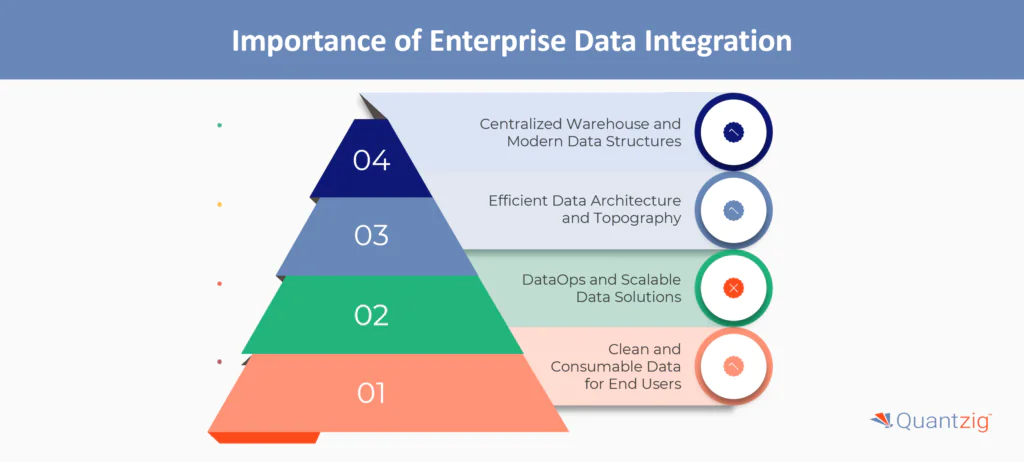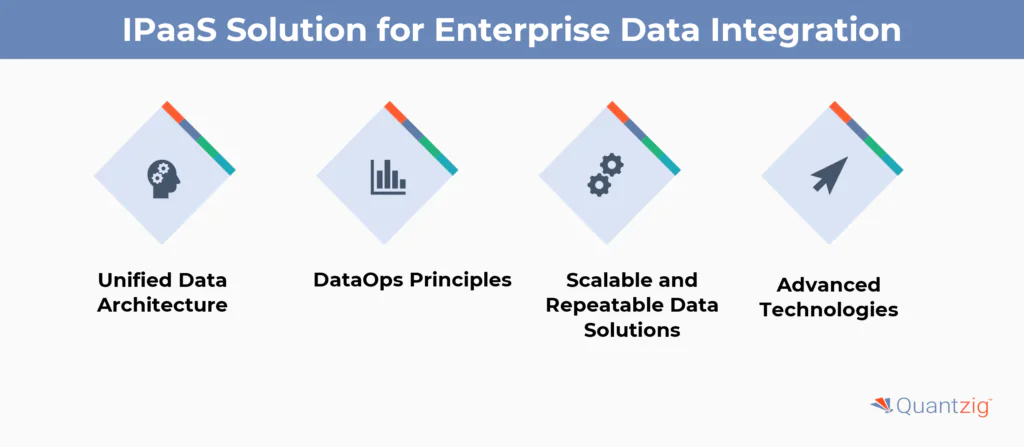Author: Associate Vice President, Analytics and Data Strategy, Quantzig.
Table of Contents
Table of Contents
- Introduction
- What is Enterprise Data Integration?
- Types of Enterprise Data Integration Techniques
- Why is Data Integration Important for Enterprises?
- What are the Benefits of Enterprise Data Integration?
- Holistic Approach to Enterprise Data Integration and Strategy
- IPaaS Solution to Enable Enterprise Data Integration
- Common Enterprise Data Integration Tools
- Future Trends in Enterprise Data Integration
- Conclusion
Introduction to Enterprise Data Integration
Nowadays, companies across industries have started recognizing the true potential of data. Monetizing data has become essential for businesses to stay ahead of the curve. However, enterprises are facing critical challenges in today’s competitive business environment such as reshaping business operations, strategies, and sales on several fronts. This is where enterprise data integration services come to the rescue.
It is high time that enterprises develop the ability to replicate and integrate their data. Businesses should accelerate the process of enterprise data integration with real-time and modern data integration solutions using analytics. Customer data processed in real-time is creating new opportunities. These services can help businesses to reduce risk, improve operational efficiency, and identify new opportunities.
Book a demo to experience the meaningful insights we derive from data through our analytical tools and platform capabilities. Schedule a demo today!
Request a Free DemoWhat is Enterprise Data Integration?
Enterprise data integration is the process of combining and unifying disparate data sources across an organization to create a single source of truth for business intelligence and decision-making. It involves integrating data from various systems, such as customer relationship management (CRM), enterprise resource planning (ERP), and legacy mainframes, to break down data silos and enable data-driven business operations.
What are the Types of Enterprise Data Integration Techniques?
| Technique | Description |
|---|---|
| Extract, Transform, Load (ETL) | – Extracts data from various source systems – Transforms the data into a standardized format – Loads the transformed data into a target data warehouse or database |
| Extract, Load, Transform (ELT) | – Extracts data from source systems – Loads the raw data into a target data store (e.g., data lake) – Transforms the data within the target system |
| Data Virtualization | – Provides a unified, logical view of data across disparate sources – Allows users to access and query data without physically moving or replicating it |
| API-led Connectivity | – Leverages application programming interfaces (APIs) to integrate data across applications and systems – Enables reusable, self-documenting data access and exchange |
| Data Fabric | – Provides a flexible, scalable, and distributed data integration architecture – Enables a unified, semantic layer for accessing and managing data across hybrid environments |
| Data Mesh | – Decentralizes data ownership and governance to domain-oriented teams – Promotes self-service access to high-quality, domain-specific data products |
These techniques offer different approaches to integrating, accessing, and managing enterprise data, each with its own strengths and use cases. Organizations often employ a combination of these methods to build a comprehensive data integration strategy that meets their specific requirements.
Why is Data Integration Important for Enterprises?

It plays a pivotal role in the success of enterprises by addressing the complexities associated with diverse data sources, ensuring a streamlined and efficient flow of information across the organization. The significance of data integration for enterprises can be encapsulated in the following key points:
1. Centralized Warehouse and Modern Data Structures
Centralizing data in a warehouse and adopting modern data structures are fundamental aspects of data integration. A centralized repository facilitates unified access, enabling organizations to harness the power of consolidated information. Modern data structures enhance the agility and scalability of data storage, accommodating the diverse needs of the organization.
2. Efficient Data Architecture and Topography
An effective architecture, supported by a well-defined topography, is critical for seamless data integration. Establishing a robust architecture ensures that data flows smoothly across systems, applications, and processes. A well-structured topography optimizes movement, reducing bottlenecks and enhancing overall efficiency.
3. DataOps and Scalable Data Solutions
Embracing DataOps principles and scalable solutions is imperative for meeting organizational needs. DataOps emphasizes collaboration, version control, and metadata management, ensuring that the data integration process is agile, transparent, and aligned with business objectives. Scalable solutions accommodate growing data volumes, sustaining performance as the organization evolves.
4. Clean and Consumable Data for End Users
The ultimate goal of this tool is to provide end users with clean and consumable data for informed decision-making. By employing these platforms, organizations can implement repeatable data solutions, enforce standardized formats, and achieve real-time monitoring. This ensures that end users have access to high-quality data, fostering accurate and timely insights.
At Quantzig, we understand the difference that enterprise data integration platform can create for companies. And to help enterprises excel in the competitive landscape, our team of experts have highlighted some of the crucial benefits of enterprise data integration that can help businesses to build a modern architecture and reduce disruptions to production workloads.
What are the Benefits of Enterprise Data Integration?
1: Data Integration Makes Data Valuable
- This tool helps in improving the approach to metadata and master data management to make data more complete, clean, and consistent. It assists in building new and valuable databases by collecting raw data from source systems and consolidating it into new datasets.
- Additionally, enterprise data integration platforms are very useful in integrating data from warehouses, master data hubs, repositories, and data marts. This further helps in enhancing the overall value of data and boosts business outcomes.
2: Creates Flexibility in IT Infrastructure
- This tool enables companies to respond to the growing customer demand by developing flexible IT infrastructures. Employees who are not tech-savvy in an enterprise face challenges in managing IT-based structure.
- This solution also helps in overcoming such obstacles by streamlining the business process. Furthermore, it helps in integrating functionality and information of several applications into a user-friendly interface.
3: Identifies New Opportunities
- This is one of the significant organizational benefits of enterprise data integration. It helps the managers to explore and respond to new market opportunities in a much better way.
- This tool can also assist companies to address issues in reputation management, shifts in the market demand, and disruptions in the supply chain from a single and unique interface.
4: Boosts Efficiency
- This solution makes an organization more efficient by minimizing their time and effort, making communication easier, and improving operational control. Also, these frameworks can enable companies to keep track of the changing market trends and supply chain disruptions.
- Consequently, this can help in realizing the overall ROI. Apart from enhancing the proficiencies of an organization, it also focuses on the performance of individuals within the enterprise.
5: Facilitates Data Synchronization
- Enterprise data integration helps in synchronizing all the available efficiently. It offers a 360-degree view of the central database.
- As a result, enterprises can gain a holistic view of various metrics responsible for deriving business outcomes such as customer data, financial inputs, and product data. This, in turn, helps in achieving better operational excellence and maintaining partnerships.
6: Makes Data Governance Easier
- This tool focuses on complex data governance issues such as risk identification, security, and privacy. It helps in improving the standards, infrastructure, and architecture of an enterprise by integrating all the datasets into a uniform platform.
7: Delivers Information in Real-Time
- With the accelerating pace of businesses, the speed of data integration has also increased with the help of modern solutions. By leveraging operational business intelligence, companies can have all the data available on analytics dashboards that give real-time information for better decision-making.
- Also, such information makes facility monitoring, activity monitoring, and utility grid monitoring much easier. Real-time reports have helped several businesses to enhance their operations in specific areas including build-to-order manufacturing, inventory management, and overnight shipping.
8. Enhanced Data Accuracy and Consistency
- One of the primary benefits of this tool is the improvement in accuracy and consistency. When data is scattered across multiple systems, there’s a higher risk of discrepancies, errors, and inconsistencies.
- EDI ensures that data is synchronized and standardized, reducing the chances of inaccuracies. This consistency in data quality empowers organizations to make informed decisions based on reliable information.
9. Improved Operational Efficiency
- This tool plays a pivotal role in enhancing operational efficiency by automating data processes and reducing manual interventions. Integrating disparate systems allows for seamless data flow between different departments, eliminating the need for repetitive entry.
- This not only saves time but also minimizes the likelihood of errors associated with manual handling. Consequently, employees can focus on more value-added tasks, leading to increased productivity.
10. Optimized Decision-Making with Real-Time Data
- In today’s fast-paced business environment, the ability to make timely decisions is critical. This tool enables organizations to access real-time data by integrating various data sources.
- This real-time visibility into business operations empowers decision-makers with up-to-date information, facilitating quicker and more informed decision-making.
- Whether it’s responding to market changes, tracking inventory levels, or assessing customer trends, real-time integration ensures that decisions are based on the most recent insights.
Experience the advantages firsthand by testing a customized complimentary pilot designed to address your specific requirements. Pilot studies are non-committal in nature.
Request a Free PilotHolistic Approach to Enterprise Data Integration and Strategy
| Element | Description |
|---|---|
| Unified Data Architecture | – Centralized data warehouses, data lakes, and data lake houses – Seamless integration of data sources for a consistent flow of information |
| DataOps Principles | – Collaboration tools and version control for data engineers – Metadata management and real-time monitoring for operational control |
| Scalable Data Solutions | – Repeatable data integration processes and pipeline design patterns – Ability to accommodate evolving organizational needs |
| Adaptive Data Standards | – Leveraging cloud-based data lakes, data streaming, and data fabric – Integrating with APIs, data virtualization, and machine learning |
A holistic approach to enterprise data integration platform and strategy ensures that the entire data lifecycle is optimized, enabling organizations to derive maximum value from their data assets. By addressing data architecture, DataOps, scalability, and adaptive technologies, this comprehensive strategy helps organizations stay agile and competitive in the face of evolving data demands.
Get started with your complimentary trial today and delve into our platform without any obligations. Explore our wide range of customized, consumption driven analytical solutions services built across the analytical maturity levels.
Start your Free TrialWhy You Need an IPaaS Solution to Enable Enterprise Data Integration?
Embracing an Integration Platform as a Service (iPaaS) solution is paramount for enabling seamless and efficient enterprise data integration. An iPaaS solution acts as a linchpin, harmonizing various data-related processes and technologies to meet the diverse needs of modern organizations.
1. Unified Data Architecture and iPaaS
- Incorporating iPaaS aligns with the goal of achieving a unified architecture and topography. By connecting centralized warehouses, data lakes, and data lakehouses, iPaaS ensures a cohesive data ecosystem.
- This allows organizations to adapt to modern data structures, accommodating the organizational needs efficiently.
2. DataOps Principles and iPaaS Collaboration
- iPaaS is inherently aligned with DataOps principles, providing features such as version control, collaboration tools, and metadata management.
- This ensures that engineers can work seamlessly within the iPaaS environment, fostering collaboration between the data plane and control plane.
- With real-time monitoring and global operational control, iPaaS empowers data engineers to optimize data integration processes effectively.
3. Scalable and Repeatable Data Solutions with iPaaS
- The scalability offered by iPaaS solutions is instrumental in addressing organizational needs as they evolve. iPaaS enables the implementation of repeatable data solutions and pipeline design patterns, ensuring consistency and reliability in data integration processes.
- This scalability is essential for managing diverse datasets, supporting BI, analysis, and meeting the requirements of end users and various applications.
4. Advanced Technologies and iPaaS Integration
- iPaaS facilitates the integration of cutting-edge technologies crucial for modern enterprises. Whether it’s cloud-based data lakes, data streaming, or data fabric, iPaaS provides a versatile framework for incorporating these advancements.
- It supports application integration through APIs, data virtualization, and seamless connectivity with machine learning projects, allowing organizations to harness the power of real-time analytics and big data.
Common Enterprise Data Integration Tools
| Tool | Key Features |
|---|---|
| Informatica | – Comprehensive data integration platform – Supports a wide range of data sources and targets, including cloud and on-premises systems |
| IBM InfoSphere | – Enterprise-grade data integration and governance suite – Provides capabilities for data quality, master data management, and metadata management |
| Talend | – Open-source data integration platform – User-friendly interface and support for various data sources, including big data and cloud-based applications |
| Oracle Data Integrator | – Scalable and high-performance data integration solution – Well-suited for large-scale enterprise environments |
| Microsoft SQL Server Integration Services (SSIS) | – Data integration and workflow platform – Tightly integrated with the Microsoft SQL Server ecosystem |
| Alteryx | – Self-service data analytics and integration platform – Empowers business users to prepare, blend, and analyze data without extensive technical expertise |
These tools offer a range of capabilities to support enterprise-level data integration, including connectivity to diverse data sources, data transformation and cleansing, workflow orchestration, and governance features. Organizations can evaluate and select the tools that best fit their specific data integration requirements and IT infrastructure.
Future Trends in Enterprise Data Integration Platform
Based on the search results, here are some key future trends in enterprise data integration:
- Increased Cloud Adoption: The rise of cloud computing will drive more enterprises to adopt cloud-based data integration solutions. These offer scalability, flexibility, and cost-effectiveness compared to on-premises systems.
- Hybrid Integration Strategies: As organizations utilize a mix of on-premises and cloud-based systems, hybrid integration approaches that seamlessly connect these disparate sources will become more prevalent.
- AI and Machine Learning-Powered Integration: Integrating AI and ML capabilities into data integration platforms will automate tasks like data mapping, transformation, and quality checks, improving efficiency and accuracy.
- Focus on Data Governance and Security: Future data integration solutions will prioritize robust data governance measures, including advanced encryption, access controls, and data lineage tracking to ensure regulatory compliance and data security.
- Real-time and Streaming Data Integration: The demand for real-time analytics will drive the adoption of technologies that enable continuous data ingestion and processing, such as event-driven architectures and change data capture.
- Democratization of Data Integration: Self-service data integration tools will empower business users to connect and integrate data without heavy reliance on IT, fostering collaboration and agility.
Experience the advantages firsthand by testing a customized complimentary pilot designed to address your specific requirements. Pilot studies are non-committal in nature.
Request a Free PilotConclusion
In conclusion, Enterprise Data Integration is a cornerstone of modern business operations, offering multifaceted advantages. From improving accuracy and operational efficiency to facilitating real-time decision-making, the benefits of EDI extend across various facets of organizational functioning. As businesses continue to leverage data as a strategic asset, enterprise data integration best practices become increasingly indispensable in driving success and maintaining a competitive edge in the market.





